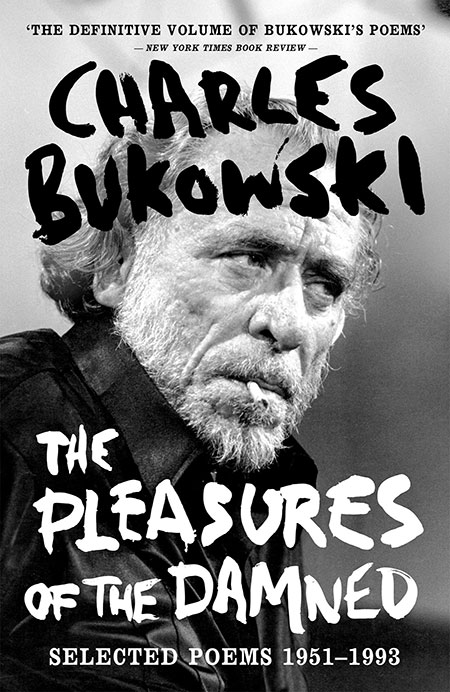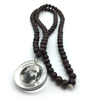The Pleasures of the Damned: Poems, 1951-1993

The Pleasures of the Damned: Poems, 1951-1993
by Charles Bukowski
Collected by Linda Lee Bukowski
Ecco, 2007, New York
506 pages
Paperback and Kindle
amazon.com – amazon.co.uk
In 2016, homeless and distraught, I took refuge for a few days with a friend in Coventry – a beautiful man I had met at Osho Leela. He put on classical music and cooked for me, and even ironed my laundry – and, when he saw me poring over a book I’d found in his well-stocked shelves, he gave it to me. It was the definitive collection by the “poet of the down-and-outs,” Charles Bukowski.
Although I’d read something about this poet in the New Yorker, I’d not really “met” him yet myself – and the meeting was a revelation. I’d have to say now I consider him one of my best friends. Here’s why:
The poems are simply stated. There are no stylistic furbelows – nothing rhymes – there are no tricks; no vanity. There’s not a word too many, yet no sense of self-conscious editing. And yet he stretches out as much as he wants.
Above all, he’s just telling it like it is. In fact, his work is full of the simple knowing and bullshit-less-ness that it takes to just put some words down on the page and not decorate them for anybody. If somebody says it’s not poetry that’s their problem.
Here’s how it really is poetry: I come out feeling excited, dazed with delight, with a kindling inside myself of something new. I feel lifted and cleaned and simplified despite the fact that Bukowski’s subject matter is usually grim, mundane, spackled with old cigarette smoke. (Leonard Cohen said, “He brought everybody down to earth, even the angels.”) It doesn’t matter – because the magic is in the seeing – the truthing – the saying plain, without asking for anything different.
The magic of transformation lies in not being ambitious for transformation (not even a particle) but just being present to what is. That is the only way something changes state – because to change state, a state must be total, as-it-is, not interfered with. If we’re hoping or trying to be more spiritual, we miss the train. It is a paradox; and I heard Osho say that the closer we come to paradox the closer we come to truth.
When we observe, allow, and don’t judge, the train goes speeding from the station, up out the top of our head in a stream of light.
Bukowski does all this in a one- or two-page poem. He must have known he was doing it – he was a beat poet after all, and one of his more than 45 books is called Slouching Towards Nirvana.
He’s dead now – died in 1993 at the age of 74 – but he lived for 50 years in Los Angeles; many poems are set in Hollywood, in a seedy area near the Sunset Strip. He spares us none of the stupidity, hopelessness, drugs and fags and dope – yet we are lifted up and charmed. He was born into some privilege – his father was an American soldier in Germany, his mother German, and he was brought to the US at the age of 3 – but he gravitated to Skid Row. Craggy, smoky, stubbled, wrinkled, he looked like the Wrath of God – and was well-embedded in that milieu.
Hark to this:
The History Of One Tough Motherfucker
he came to the door one night wet thin beaten and
terrorized
a white cross-eyed tailless cat
I took him in and fed him and he stayed
grew to trust me until a friend drove up the driveway
and ran him over
I took what was left to a vet who said, “not much
chance… give him these pills… his backbone
is crushed, but it was crushed before and somehow
mended, if he lives he’ll never walk, look at
these x-rays, he’s been shot, look here, the pellets
are still there… also, he once had a tail, somebody
cut it off…”
I took the cat back, it was a hot summer, one of the
hottest in decades, I put him on the bathroom
floor, gave him water and pills, he wouldn’t eat, he
wouldn’t touch the water, I dipped my finger into it
and wet his mouth and I talked to him, I didn’t go any-
where, I put in a lot of bathroom time and talked to
him and gently touched him and he looked back at
me with those pale blue crossed eyes and as the days went
by he made his first move
dragging himself forward by his front legs
(the rear ones wouldn’t work)
he made it to the litter box
crawled over and in,
it was like the trumpet of possible victory
blowing in that bathroom and into the city, I
related to that cat – I’d had it bad, not that
bad but bad enough
one morning he got up, stood up, fell back down and
just looked at me.
“you can make it,” I said to him.
he kept trying, getting up falling down, finally
he walked a few steps, he was like a drunk, the
rear legs just didn’t want to do it and he fell again, rested,
then got up.
you know the rest: now he’s better than ever, cross-eyed
almost toothless, but the grace is back, and that look in
his eyes never left…
and now sometimes I’m interviewed, they want to hear about
life and literature and I get drunk and hold up my cross-eyed,
shot, runover de-tailed cat and I say, “look, look
at this!”
but they don’t understand, they say something like, “you
say you’ve been influenced by Celine?”
“no,” I hold the cat up, “by what happens, by
things like this, by this, by this!”
I shake the cat, hold him up in
the smoky and drunken light, he’s relaxed he knows…
it’s then that the interviews end
although I am proud sometimes when I see the pictures
later and there I am and there is the cat and we are photo-
graphed together.
he too knows it’s bullshit but that somehow it all helps.
Or this:
The Railroad Yard
the feelings I get
driving past the railroad yard
(never on purpose but on my way to somewhere)
are the feelings other men have for other things.
I see the tracks and all the boxcars
the tank cars the flat cars
all of them motionless and so many of them
perfectly lined up and not an engine anywhere
(where are all the engines?).
I drive past looking sideways at it all
a wide, still railroad yard
not a human in sight
then I am past the yard
and it wasn’t the damned commerce of it all
that gives me what I get
but something back there nameless
always making me feel better
as some men feel better looking at the open sea
or the mountains or at wild animals
or at a woman
I like those things too
especially the wild animals and the woman
but when I see those lovely old boxcars
with their faded painted lettering
and those flat cars and those fat round tankers
all lined up and waiting
I get quiet inside
I get what other men get from other things
I just feel better and it’s good to feel better
whenever you can
not needing a reason.
“Yes! yes!” I think, reading this one; “me too! Isn’t it odd of us…” I could go on and on. I put sticky-note markers at so many poems the book is bristling – that’s how much I like it.
Good poetry gives itself complete permission
- Log in to post comments
- 12 views
